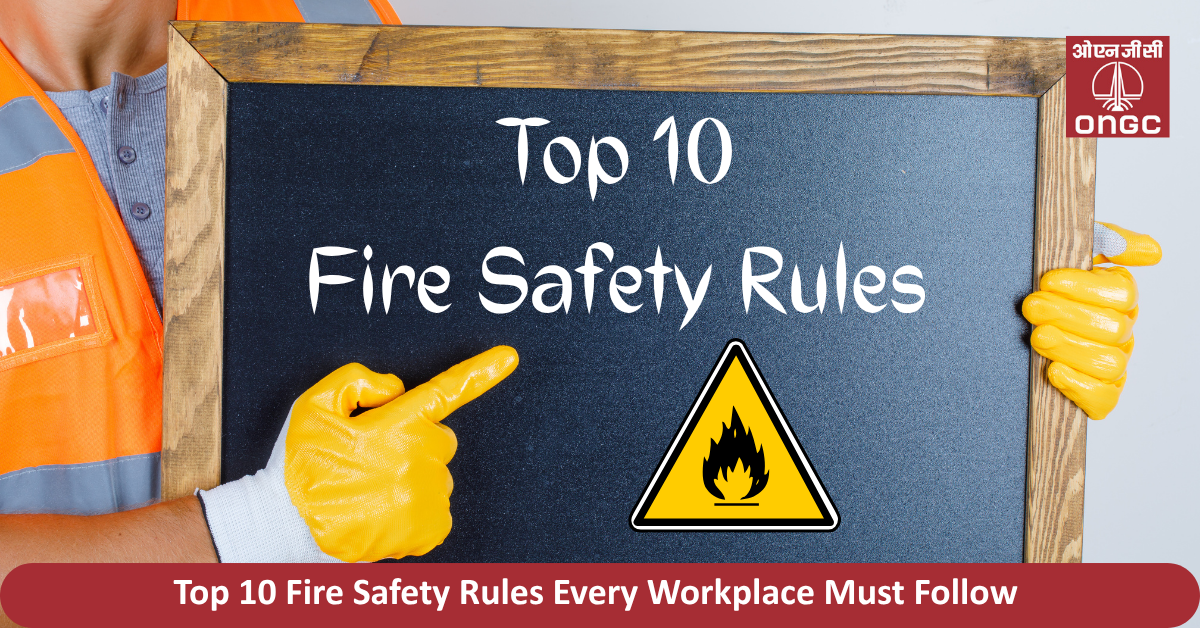Top 10 Fire Safety Rules Every Workplace Must Follow
- Posted by ATI ONGC
- Date September 30, 2025

Imagine that you’re at work on a normal day, and all of a sudden, the fire alarm starts to ring. within a fraction of a second, smoke fills the entire hallway, and panic got spread over everywhere. This is where every-second matters. This is the harsh reality of the fire accidents that happen in the workplace that strike you at an unexpected time, and it could change your normal day into a life-threatening emergency.
That is where fire safety comes in and takes up the upper hand. More than just a rule, it’s a lifesaving matter. An one single fire accident can risk lives, destroy property, and also endanger the business operations for weeks or months, or could never be regained. All these could be prevented just by following proper fire safety rules through which organizations could protect their people, safeguard assets, and make sure that they run a smooth business.
Following workplace fire safety rules under OSHA, NFPA, or India’s NBC isn’t just about ticking off a legal checklist, it’s about making sure every employee goes home safe at the end of the day. Moving forward in this blog, you’ll have the clear idea of the Fire Safety measure and about building a workplace where people know the value of their lives and about true Safety.
Why Fire Safety Rules Matter at the Workplace?
Fire Safety is not just a rule; it’s a responsibility to protect people and their lives. Here’s why every workplace should make Fire Safety a top priority:
Following the law: Rules from OSHA, NFPA, and NBC aren’t just red tape, they exist to keep workplaces safe. Ignoring them can lead to fines, legal trouble, or even a shutdown.
Protecting people and property: Employees are the heart of any organization, and their safety should always come first. Along with that, equipment, documents, and buildings also need to be protected.
Maintaining trust: A single fire can harm more than just the workplace; it can damage an organization’s reputation and make clients or customers lose confidence.
Avoiding financial loss: Fires can lead to downtime, expensive repairs, and insurance claims. Preventive safety rules help businesses save money and avoid setbacks.
Top 10 Fire Safety Rules Every Workplace Must Follow
1. Conduct Regular Fire Risk Assessments: Conducting regular assessments helps to identify fire hazards before they become emergencies. Employers should find the risks of their workplace and should fix the problems.
2. Install and Maintain Fire Detection Systems: Early fire detection is essential, so smoke detectors,fire alarms, and other detection systems should be installed and maintained regularly to make sure they function during emergencies.
3. Ensure Accessible Fire Exits: Emergency exits should be easy to access, clear to see, and most importantly, the employees should know the escape routes to leave safely during fire.
4. Maintain Fire Extinguishers and Suppression Equipment: Fire extinguishers and suppression systems should be easy to access, regularly checked, and employees should know how to use them safely.
5. Train Employees on Fire Safety Procedures: Training plays a crucial role in fire safety because it reduces panic and confusion during emergencies. Therefore, it is advised to conduct regular fire drills and ensure the employees understand the procedures for evacuation, using equipment, and reporting incidents.
6. Develop a Workplace Evacuation Plan: A clear evacuation plan is essential. It should show assembly points, escape routes, and the duties of key staff.
7. Store Flammable Materials Safely: Flammable liquids are strictly advised to be stored in proper containers and appropriate locations. Following the Safety rules reduces the risk of accidental fires.
8. Avoid Electrical Hazards: Electrical faults are the major cause for workplace fires. Regular maintenance, Avoiding overload circuits, and using certified electrical equipment can prevent electrical fires.
9. Keep Fire Doors Closed and Operational: Fire doors help contain smoke and fire, providing critical escape time. Ensure they are always closed and functioning properly.
10. Establish a Fire Safety Committee and Reporting Syste: A dedicated team ensures ongoing fire safety management. Fire wardens and reporting systems help monitor hazards and maintain accountability.
Role of Employers and Employees in Fire Safety
Fire safety is a shared responsibility:
Employers: Must provide fire safety equipment, conduct training, and ensure compliance with regulations.
Employees: Should follow safety procedures, participate in drills, and report potential hazards.
Conclusion
Fire safety isn’t just a rule-book; it’s about protecting people, their families, and the livelihoods they depend on. A workplace fire can change lives in seconds, but the right precautions can prevent tragedy. By following these 10 simple yet powerful rules, you’re not only keeping your team safe but also showing them that their wellbeing comes first. When employees feel protected, they work with more confidence and peace of mind. Safety builds trust, and trust builds stronger teams and businesses. Remember, a safe workplace is a thriving workplace.
Let us help you build a safer, stronger, and more prepared workplace because your people deserve nothing less.
FAQs Related To Fire Safety Rules
What is the first rule of fire safety in the workplace?
Conduct regular fire risk assessments to identify and mitigate hazards.
How often should fire drills be conducted at work?
Ideally, every six months or as mandated by local regulations.
Who is responsible for enforcing fire safety rules in a company?
Employers, supported by fire safety committees and designated fire wardens.
What type of fire extinguisher should be used in office spaces?
Typically, ABC dry chemical extinguishers are suitable for common office fires.
How do you create an effective workplace evacuation plan?
Identify routes, assembly points, assign responsibilities, and regularly train employees.
Why are regular fire risk assessments important?
They help identify potential hazards early, reducing the likelihood of fire incidents.
What are the legal fire safety requirements for workplaces in India?
Compliance with the National Building Code (NBC) of India, including fire alarms, exits, and extinguishers.
How should flammable liquids be stored in factories or offices?
Store in approved containers, away from heat sources, and in well-ventilated areas.
Can employees use elevators during a fire emergency?
No, elevators are unsafe; always use designated emergency stairs.
What should employees do if they discover a fire at work?
Activate alarms, alert colleagues, attempt safe extinguishment if trained, and evacuate immediately.
How do you maintain and test fire alarms regularly?
Conduct monthly testing and annual maintenance checks by certified professionals.
What is the role of a fire warden in the workplace?
Fire wardens assist in evacuation, ensure safety compliance, and report hazards.
How can companies prevent electrical fire hazards?
Regular inspections, proper wiring, and avoiding overloading circuits.
What is the difference between fire exits and fire doors?
Fire exits are escape routes; fire doors prevent the spread of fire and smoke.
Why is employee training critical for fire safety compliance?
It ensures awareness, proper response during emergencies, and reduces the risk of injuries or fatalities.
